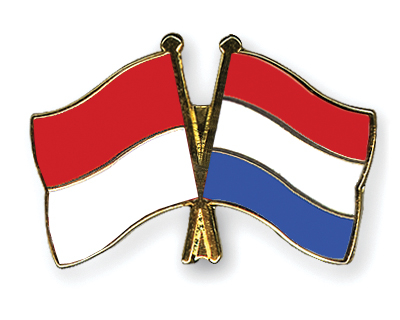When Indonesia finally received full independence in 1949, the people of Indonesia had no idea of the conflicts and hardships they would soon face with the Netherlands when they named Achmed Sukarno effectively the permanent president.
Map of Indonesia and the Netherlands
http://en.wikipedia.org/wiki/File:Indonesia_the_Netherlands_Locator.svg
Sukarno’s involvement in the Indonesian war with his harsh militaristic approach after subtle forms of democracy led Indonesia to invasion and violence and global concern. Sukarno ruled over Indonesia with a harsh dictatorial rule, and moved to get the UN to resolve the dispute over the possession of West New Guinea, known to the Indonesians as their state of Irian Jaya, which remained under Dutch rule. When the UN failed to resolve the possession issue, Sukarno called all Indonesians to strike out against all Dutch-owned businesses, and he cast out many Dutch nationalists. Dutch houses and businesses were also seized and nationalized by the government. Sukarno’s brutal, anti-Dutch actions spawned the fleeing of approximately 40,000 Netherlanders from Indonesia. Those that fled found that their abandoned businesses had been taken over and were now run by the Indonesian army. Because of Sukarno’s actions, however, the Netherlands were forced to open negotiations with Indonesia over the possession of West New Guinea, however to no avail as the negotiations failed. Due to this failure, the Netherlands prepared themselves for the worst from Indonesia, effectively barricading West New Guinea for the impending attack. In 1962, Indonesian paratroopers and native guerillas launched war against the Netherlands’ occupation of their ‘Irian Jaya’. The United States and the UN immediately rushed to organize more peace talks as the as the violence escalated exponentially in the area. On August 15th, 1962, the Netherlands passed on ownership of West New Guinea to UN in the Indonesian-Dutch Aggreement, to prevent further movements and violence against them from the Indonesians. In 1963, the UN passed on their ownership to Indonesia.
Flag of Indonesia and the Netherlands
http://www.crossed-flag-pins.com/Friendship-Pins/Indonesia/Flag-Pins-Indonesia-Netherlands.jpg
Under Sukarno’s rule, although brutal and menacing to the point of a reign of terror, it brought Indonesia to understand the meaning of being a powerful nation, even right out of becoming an independent nation. Although the negotiations with the Netherlands could be viewed to the majority of the world as violent and terrifying, it also brought new meanings of power and control to the Third World countries, emerging from the dust of Imperialism and cultural, political, economic, and religious hegemonies.
Monday, June 6, 2011
Subscribe to:
Post Comments (Atom)


0 comments:
Post a Comment